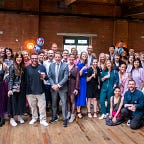The future of cities
Big questions are being asked about how city centres can be rejuvenated post-pandemic. In Manchester, a pioneering £1.5bn innovation district is being built that will create jobs and economic growth.
In a few days in March 2020, the basic equation for a successful British city changed, perhaps forever. The old rules were simple. A successful city required big offices, for whole companies to be together; hyper-connected transport links, for their workers to get in and out; shops and cafés to buy their Pret sandwiches; a thriving after-work economy; nice neighbourhoods on the ends of the transport links; and a few creative firms in the cheap parts of town.
Suddenly, when a large portion of the workers were ordered to work from home, the equation broke. Offices were empty, and looked like staying partially empty. Cafés and shops withered, the night-time economy died and the transport links were under-utilised.
The dormitory neighbourhoods blossomed. Local shops and restaurants boomed. Many home workers left the city, causing property booms in pretty towns and coastal retreats.
Now, as the economy returns, the city will reshape itself, lead our economic recovery and be our main job creators. Cities are living organisms that have evolved many times in the past. It’s a rare chance to do some big thinking about how we live in urban centres. How can we build a fairer economic model, a greener city, a healthier population, enough homes and a more equal society?
Manchester’s new innovation district
In Manchester, one view of the future of cities is taking shape in the old university campus.
A £1.5 billion innovation district is being built that will be a world-leading science and technology hub. ID Manchester covers 26 acres and could create more than 10,000 high-quality, resilient new jobs in the next ten to 15 years, transforming the productivity, employment, competitiveness and economic and social prosperity of the region.
It’s in the city centre, and includes 2.6m square feet of commercial workspace, 1,300 new homes, two hotels, and £28m investment in public spaces. It’s a partnership between The University of Manchester, property developer Bruntwood SciTech — which has developed innovation hubs all over the UK including Leeds and Liverpool — and investor L&G. It’s inclusive capitalism in action: a long-term investment that meets its requirements as an investor, in a project that creates a better society.
magneticNorth has worked with Bruntwood SciTech throughout the bid process to help shape thinking on digital, brand and telling the story of ID Manchester’s ambitious mission. We’re looking forward to being part of the next phase as we begin the process of bringing this extraordinary vision to life.
The project builds on the progressive spirit of both the city’s and the university’s past. The university is where the atom was split, the first programmable computer was developed, and graphene, the world’s thinnest, strongest material, was discovered.
By creating a global community of science and tech firms working in close proximity, the intention is not only for discoveries to be made and ideas tested, but for them to be shared and built on by a network with different skills and specialisms, collaborating to turn them into the buildings, products and technology of tomorrow.
Creating the conditions for scenius
Scenius is Brian Eno’s word for communal genius, where brilliance comes not from lone individuals but arises in a scene. Creativity and innovation arise when diverse talents work together in one place. They see what each other is doing, they copy and develop ideas, and outside-the-box thinking flourishes.
Think of the Bloomsbury Group, the Bauhaus and Manchester’s music scene. Across decades, Manchester has produced not just some of the UK’s best bands but an ecosystem of talent including record labels and shops, studios, clubs, DJs, promoters, music writers, graphic designers, fashion designers and more.
Scenius is notoriously tough to create from scratch. No one expected a tiny, early Sex Pistols gig in Manchester in June 1976 to trigger a whole scene. But the audience included the founding members of Joy Division and Buzzcocks, who were inspired to form their own bands, which inspired others, and so on.
The university will be hoping to facilitate the 21st-century tech equivalent of such an ecosystem. A place where talent, space and capital can be blended to address the challenges facing the world, with everyone working, ultimately, to improve the health, wealth and happiness of the people of both Manchester and far beyond.
The city will prevail. It always does.
To find out more about our digital placemaking work, contact Lou Cordwell or drop us a line.
This is an excerpt from our latest book Now for the tricky bit; it’s all about building stronger, happier businesses with purpose. Click here to request your copy now.
